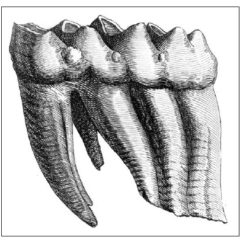Never trust confessions, psychologists know: we are prone to confess crimes we never did. Is the Neanderthal extinction a case in point? It could be, following the suggestion of a paper recently published on PLOS One by Krist Vaesen et al: Neanderthal would have gone extinct even without us.

The way the story goes, we killed them. At the end of the Ice Age, while Neanderthals were holding Europe, a new wave of anatomically modern humans came from the south and slowly, but relentlessly, fighted with them or at least outcompeted them up to extinction -together with Denisovans and possibly other non-sapiens human species. As such they can be considered, with the rest of the Pleistocene megafauna, among the first victims of the man-made sixth mass extinction, and so I depicted them in my book. Neanderthals are our mark of Cain, the brothers whose blood still stains our hands.
Or maybe, not. J.L.Borges used to say that the proofs of death are mere statistics: and indeed statistics is enough to prove that extinction is, under reasonable circumstances, almost inevitable in the long run. If members of a population are born and die with more or less the same frequency, the population oscillation will sooner or later hit a descending phase by mere chance, until it gets to zero. It might take a long time but it is almost assured it will happen. The smaller the population, the easier it is to happen. Neanderthals had small populations, and scattered. This is enough to doom any species.
This is the crudest model; better models are possible and the one of the study takes into account, for example, the so-called Allee effect, that correlates the population size/density to the individual fitness. In other words, in group there is strengths. There are a myriad reasons for that: a more diverse genetic pool, the ability of flocking or schooling for defense, less energy to spend finding a sexual partner, and so on. This is important to keep in mind even today, since it means many species become basically a lost cause even when hundreds or thousands of individuals are still alive.
The Neanderthals apparently were never many, and never very dense. We have to imagine them as small scattered tribes of hardy lonely wanderers. And so, according to the study, they could have just died by themselves, even if the modern humans (us) never appeared on the scene.
Does this mean we are absolved? Not really. I am not capable of judging the mathematical model now. But even if perfect (and such models never are) it only means it could have happened anyway. It does not mean we were not involved. We did interact with Neanderthals. We interbred with them, so much fragments of their genome survive in ours. According to other models, for example, we shared diseases. Our history and the history of Neanderthals are robustly tied together.
But it is an interesting reminder of how we tend to weave stories into the patterns of life. Our brothers on this planet all died, only us standing. It is easy to find pride in this, and dissimulate it as guilt: it becomes a fascinating story. But fascinating stories are fictions of our brains. The reality of the world is made of chaos and impersonal forces, and under their gale we live and die. It could be mere statistics, it could be us, it does not matter for the Neanderthal bones, every day a bit less forgotten, yet no less cold.
